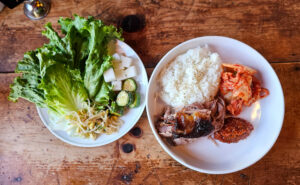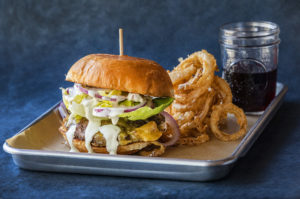 UDPATE: I had an opportunity to speak with Petaluma Poultry’s Steve Marht about the study. A third-generation chicken farmer, Marht was obviously pained by the conclusion. You can read his response to the study on the website. But I thought this quote kind of summed things up. “I was really saddened that these guys slammed me. It took five years to break even (financially) with organic. (Marht claims to be the first producer of organic eggs in California and has been in business locally for 27 years). My farm is kind of like my backyard. I don’t sleep at night because (this kind of thing) bugs me so bad. We are trying to do it right. Organics should be for the many, and not the few. And I want everyone to have our organic eggs to we keep them as affordable as we can.”
UDPATE: I had an opportunity to speak with Petaluma Poultry’s Steve Marht about the study. A third-generation chicken farmer, Marht was obviously pained by the conclusion. You can read his response to the study on the website. But I thought this quote kind of summed things up. “I was really saddened that these guys slammed me. It took five years to break even (financially) with organic. (Marht claims to be the first producer of organic eggs in California and has been in business locally for 27 years). My farm is kind of like my backyard. I don’t sleep at night because (this kind of thing) bugs me so bad. We are trying to do it right. Organics should be for the many, and not the few. And I want everyone to have our organic eggs to we keep them as affordable as we can.”
Marht spoke at length to BiteClub about his operation, which is considered medium-sized at about 250,000 birds. By comparison, NuCal Foods, in Ripon, Ca., which processes eggs for a number of major grocers and private labels, handles approximately 7.5 million eggs from 11 farms and 7 plants per day. Smaller producers may have up to 1,00 birds, but often less than a few hundred.
In the end, making a choice about eggs comes down to being an informed consumer and purchasing with your conscience. Check out this article for more details on labeling and processing.
+++++++++++++++++
The Cornucopia Institute has released it’s “Organic Egg Scorecard” rating 70 egg producers around the country. With the recent salmonella outbreak, customers are increasingly wary of factory-farmed eggs, and many are looking for more sustainable, organic choices. But be wary of those labels, because funky cardboard packaging and promises of happy chickens don’t always mean well-bred eggs.
The Institute looked for small-to-medium sized family farms raising pastured chickens sold under the farm’s name or to natural grocery stores for it’s highest score of “Exemplary”. At the bottom were large-scale farms that don’t allow for outdoor access.
A few caveats which bear mentioning, however. This study is primarily focused on outdoor access and pasturing for hens, which in my mind isn’t the total picture. Having talked to many poultry producers in the area, I can tell you that raising poultry in pastures is a logistically and financially intensive enterprise, even for the most ethical of producers and near-impossible for large-scale operations. Poultry producers and organic standards boards themselves argue about outdoor access for the birds, as to what is meaningful and natural for the animals versus the economics of creating outdoor access, threats of disease and predators. Organic certification doesn’t necessarily mean that birds must have outdoor access, and often “access” simply means a door or two that the birds often don’t use. It’s hard to argue that chickens that live in small outdoor henhouses and peck and scratch at the dirt and eat bugs are probably more “natural”, but at what cost?
Boutique organic eggs can cost upwards of $5 to $7 a dozen (which is what I paid this week at the farmer’s market), whereas conventional eggs range froom $1.99 to $2.99 and “organic eggs” around $4-$5. I don’t know about you, but at $7 a dozen, I’m not making omelets for breakfast. I actually purchased “organic” grocery eggs to supplement our egg use.
The Takeaway: While small-scale family operations which allow for pasturing are obviously ideal, it’s not always possible to achieve that highest standard. Best bets are to buy eggs at local farm markets or eggs that are pasture raised, but a good bet is to find eggs from hens raised in humane conditions (cage-free) that are fed a vegetarian diet and not treated with hormones or antibiotics.
Here’s the Institute’s Scoreboard for NoCal Organic Eggs…
5-eggs (Beyond Exemplary)
Alexandre Kids, Cresent City
Elkhorn Organics, Prunedale
Vital Farms (from Austin, but available at Whole Foods Markets)
St. John Family Farm, Orland
4-eggs (Excellent)
no local producers
3-eggs (Very Good)
Clover Stornetta, Petaluma
Wilcox Farms (from Washington, but distributed on the West Coast)
2-eggs (Fair)
no local producers
1-egg (“Ethically Deficient”)
Judy’s Family Farm (Petaluma Farms), Petaluma
The study argues that this large-scale operation (which is family-owned) does not provide outdoor access. The farm’s organic certifying agent (Oregon Tilth) has granted them permanent exeption based on the threat of avian influenza. Petaluma Farms, a large‐scale egg producer in Petaluma, CA, produces both organic and conventional cage‐free eggs for sale under several brand names, which include Judy’s Family Farm, Rock Island, Uncle Eddie’s Wild Hen Farm and Gold Circle. They also produce eggs for the 365 label owned by Whole Foods and Organic Valley for Western US markets.
Petaluma Farms’ hens are, according to its owners, are “cage free, raised with no antibiotics, fed an all vegetarian diet (no animal by-products in their food), raised at the same location near the Pacific Ocean in Northern California, and raised with water, air and housing standards equal to OCIA organic standards.”
Also receiving 1 egg were national egg producers Horizon Organic, Land O’Lakes and Eggland’s Best.
Read the Cornucopia Institute’s full report (fascinating).
What’s your take? Is all the fuss a crack-up, or is there something to be said for outdoor access for chickens?
How organic are your eggs?
Study takes on 70 "organic" egg producers









